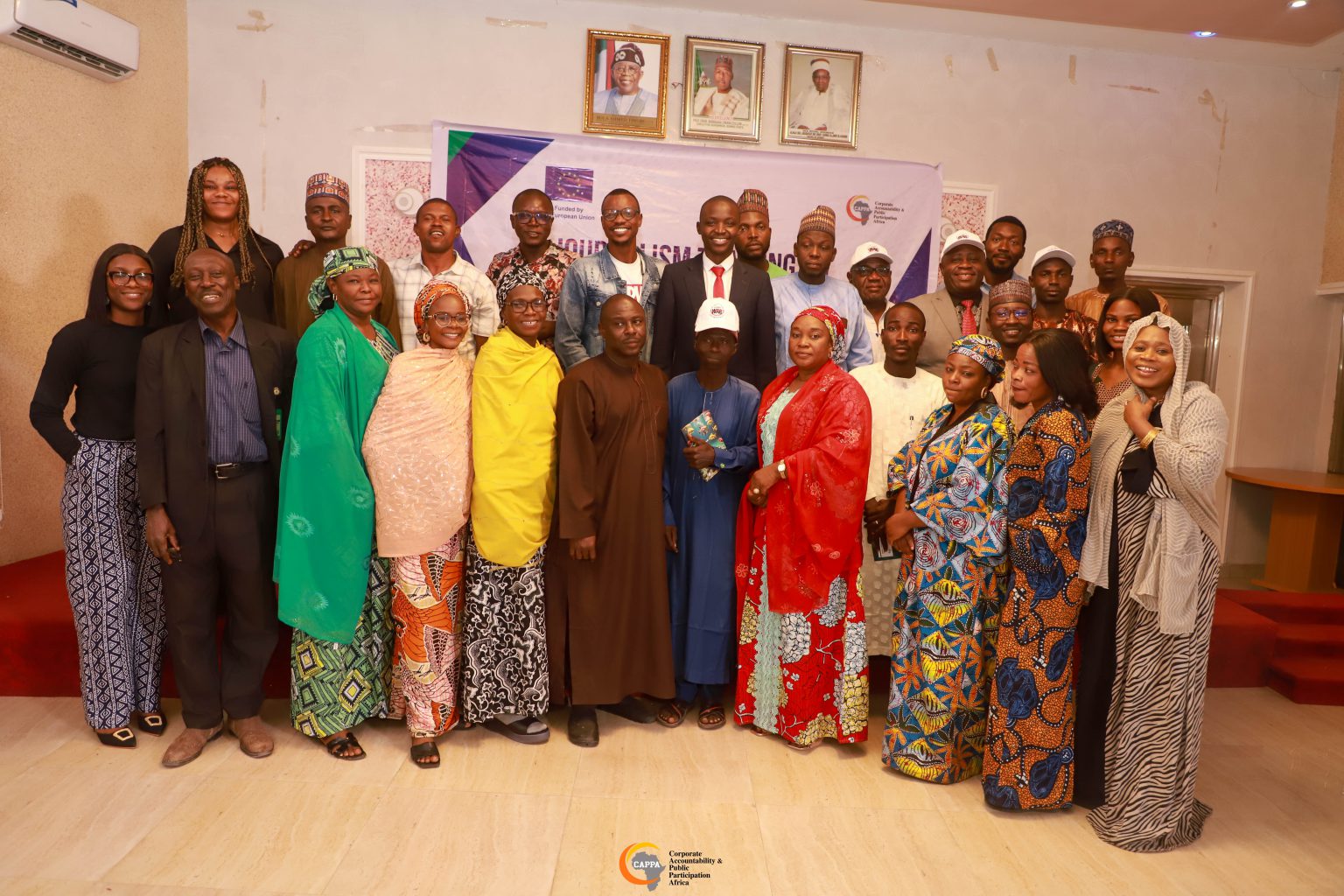As part of its commitment to promoting citizen participation and non-violent engagement before, during, and post-election, Corporate Accountability and Public Participation Africa (CAPPA) has organised a two-day capacity-building training for media practitioners in Bornu State, on promoting peace during elections through conflict-sensitive reporting.
The training, organized with the support of the European Union Support for Democratic Governance in Nigeria (EU EDGN), was held on December 17 and 18 in Maiduguri.
Featuring media and civil society experts, it exposed media practitioners to elements of media coverage, inclusive reporting and fact-checking of the electoral process.
CAPPA’s Executive Director, Akinbode Oluwafemi, while welcoming the participants, noted that the media – as a critical stakeholder – has a crucial role to play in fostering peace during the pre-and post-election periods.
Oluwafemi, whose message and paper presentation were delivered by CAPPA’s Policy and Research Manager, Zikora Ibeh, harped on the need to build journalists’ capacity to promote non-biased reporting and become conversant with the nation’s electoral process.
The Executive Director, in his paper on “Expanding Nigeria’s Democracy and Civic Space: The Media as Drivers for Sustainable Democracy,” maintained that journalists can effectively use their pen to shape the country’s economic situation and hold the government accountable to the people.
He acknowledged the role and contribution of the media towards Nigeria’s independence and entrenchment of the present democracy, adding that journalists remain critical stakeholders of the country’s electoral process.
In his presentation on “The Media’s Role as Society’s Watchdog” Robert Egbe, Media and Communications Officer at CAPPA noted that the media plays a vital role in ensuring good governance and accountability in Nigeria.
“However, it faces numerous challenges that threaten its ability to fulfil this role effectively. To strengthen its watchdog role, the media must adhere to professional standards, and find innovative ways to overcome economic constraints which will strengthen it to better resist government interference.
READ ALSO: CAPPA Trains Benue Journalists On Peaceful Polls
“By upholding its watchdog role, the media can contribute significantly to building a more just, equitable, and democratic Nigeria,” Egbe added.
Project Assistant, EU-SDGN II initiative at CAPPA, Chidinma Eferebo, whose presentation was delivered by Abayomi Sarumi, Senior Programme & Digital Campaign Manager, CAPPA, identified the goals of the training, including “to examine challenges facing journalists in reporting elections and electioneering processes in Nigeria and to build the capacities of journalists in non-biased reporting and promotion of peaceful and nonviolent electoral processes.
Shade Oyelade, Policy and Legal Drafting Officer, CAPPA reinforced journalists understanding of the laws governing their work and election reportage through her presentation titled: ‘The Electoral Law and Provisions for the Media’.
“Understanding and adhering to electoral laws and media provisions is crucial for maintaining the integrity of the electoral process. These laws, regulations, codes, and guidelines ensure that voters receive accurate and unbiased information, contribute to fair and competitive elections, and uphold the tenets of the democratic process.
“The media as an essential fulcrum of the electoral process plays a strategic role in ensuring this is attainable,” Oyelade added.
Abayomi Sarumi, Programme & Digital Campaign Manager, CAPPA, in his session titled “Fact-checking and the digital media trends”, emphasised, among others, the need for journalists to confirm information before publishing.
He introduced participants to media resources that can enhance their reportage, including Google Reverse Image Search or TinEye.com for images and RevEye.com or InVid for videos.
An engaging session on “Conflict Sensitive Journalism: Election and Post-Election Roles of the Media” was presented by Lanre Arogundade, Executive Director of International Press Centre (IPC), who was represented by Gbenga Akingbule, Nigeria correspondent of the Wall Street Journal.
Arogundade sensitised journalists on, among others, the need to acquire several skills, including how to carry out conflict analysis and mapping in the context of elections, know how to de-escalate electoral conflicts and provide peace messages, how to respect the sensibilities of others, especially vulnerable groups during elections and how to play a desired role in the management of electoral conflicts.
Blessing Oladunjoye, Publisher, BONews Service in her session titled ‘Inclusive Reporting: Understanding Elections and Disability Act’, highlighted the provisions of the Disability Act and how journalists need to shape their reports to enhance the smooth participation of Persons with Disabilities in the electoral process.
Oladunjoye, who stressed the importance of using the right language in reporting disability issues during elections, charged journalists to ensure a positive portrayal of PWDs in media reports.
She said “Inclusive election reporting is crucial for a fair and democratic process. Journalists should play a key role in ensuring that the voices of marginalized groups; women, youths and PWDs are heard and respected.
She also charged the journalists to “commit to inclusive practices in election reporting and supporting initiatives that promote the rights of marginalized groups in the electoral process, bearing in mind that elections are not limited to the polls.”
In her presentation on “Post-Session Reactions & Commitment Building” CAPPA’s Policy and Research Manager, Zikora Ibeh commended the media for their efforts in safeguarding Nigeria’s democracy. She charged journalists not to be daunted by challenges in carrying out their duties.


